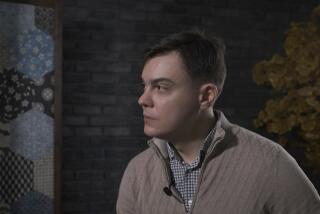Soviet Party Ousts Architect of Glasnost
- Share via
MOSCOW — Alexander N. Yakovlev, the owlish architect of President Mikhail S. Gorbachev’s policies of openness and democratization, on Thursday was ordered thrown out of the Soviet Communist Party, which he had fought long and ultimately unsuccessfully to change.
In a brief statement, the party’s Central Control Commission said the former Politburo and Secretariat member’s continued presence in the party was impossible “because of his actions running counter to the party rules and aimed at splitting the party.” The commission, in charge of party discipline, “proposed”--in effect, ordered--the party cell to which Yakovlev belongs to discharge him.
Communist conservatives have been fed up with Yakovlev’s criticisms of the party’s acts and beliefs, which reached its pinnacle this month when he blamed the problems of the Soviet Union on the “dogma of Marxism.”
Along with former Foreign Minister Eduard A. Shevardnadze, who quit the party earlier this year before he could be purged, Yakovlev, 67, is one of the guiding lights of a new, pro-reform group created outside the Communist Party, the Democratic Reform Movement.
Along with the order to oust Yakovlev, which will fortify the conviction of many here that the Communist Party has ossified into a bureaucracy irrevocably hostile to change, the customary August doldrums of Soviet politics have been disrupted by rising criticism among ranking Moscow officials of Gorbachev’s Union Treaty, the signing of which is to begin next Tuesday in the Kremlin.
In one high-level blast, Valentin S. Pavlov, the Soviet prime minister, said in a television interview aired this week that the treaty as now written would weaken the “unified economic complex” of the Soviet Union by dividing the national wealth among the various republics.
In a newspaper interview, the president of the central Soviet state bank complained that Gorbachev’s blueprint contained “completely unacceptable” provisions that would allow any of the republics to torpedo the central government’s policy on money and credit, which he said could lead to the collapse of the ruble.
Indeed, the definitive text of the Union Treaty, printed Thursday by many of the Moscow-based daily newspapers, showed that Gorbachev has made some concessions to win the assent of the constituent Soviet republics to his plan for a relative decentralization of powers. On Tuesday, Russia, Kazakhstan and Uzbekistan are to become the first republics to sign the treaty creating the Union of Soviet Sovereign Republics.
Although the division of responsibilities between Moscow and the republics is very murky, the final version of the treaty, hammered out during a meeting between Gorbachev and the leaders of the republics at a country estate outside Moscow, considerably expands the powers of the republics in the formulation and execution of central government policies.
The Soviet of Republics, one of the chambers of the bicameral legislature, will be formed by delegates from the republics and must approve the makeup of the national Cabinet of Ministers proposed by the Soviet president. Additionally, the prime ministers of the republics will be entitled to take part in Cabinet meetings and will have a “deciding vote,” the text says.
Eight of the republics have said they will sign the new power-sharing arrangement. Of the rest, the Ukraine wants to debate the treaty to see if it is in accord with its own declaration of sovereignty, Armenia has scheduled a referendum and Lithuania, Latvia, Estonia, Georgia and Moldova have flatly refused.
The timing of the order to expel Yakovlev from the Communist Party kindled speculation among some Soviets that it might have been part of a quid pro quo to win the assent of party hard-liners to the Aug. 6 departure of right-winger Ivan K. Polozkov as leader of the Russian party organization.
Polozkov’s successor, Valentin A. Kuptsov, lent credence to that interpretation through remarks made in an interview with the party’s weekly journal Glasnost, in which he said the Communist Party should strive for middle-of-the-road policies and that hard-liners and radical reformers were fated to leave anyway.
“I am a centrist by nature. I can be criticized both from the right and the left,” Kuptsov said. “In my opinion, the extreme political groups, the so-called wings, will break away this year.”
Yakovlev, a former ambassador to Canada, exercised ultimate control over the Soviet press, television, literature and culture in the first years of Gorbachev’s tenure. Considered one of Gorbachev’s firmest allies on the Politburo, he was responsible for formulating and implementing the party’s policy of glasnost , or openness, and democratization of the political system.
But he eventually grew to loathe the party he joined in 1944, when he was in the Soviet army. In an interview with the official Tass news agency this month, he blasted the “active sabotage” by party bureaucrats of social and economic change.
Formerly senior adviser to Gorbachev, Yakovlev resigned from that position last month, reportedly in poor health. In the Tass interview, he did not conceal the political differences that have sprung up between him and the Soviet leader.
“Unfortunately, he (Gorbachev) continues to believe the party can be renewed. I don’t believe it anymore,” Yakovlev said.
Russian television news led its evening broadcast with a dispatch on the purge of Yakovlev, in an evident attempt to highlight the latest victim of Communist Party orthodoxy. But conservative Communists said that, given Yakovlev’s current beliefs, he had no business remaining in the party.
“I know quite well the political road Yakovlev has traveled,” commented Richard I. Kosolapov, a leading conservative party ideologue. “He gradually, and of late very quickly, diverged from the principles on which the party is built. The decision to expel Yakovlev is perfectly logical--after all, why should one belong to a party that is not his?”
More to Read
Sign up for Essential California
The most important California stories and recommendations in your inbox every morning.
You may occasionally receive promotional content from the Los Angeles Times.













